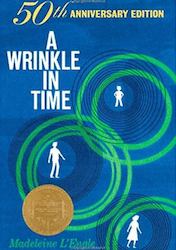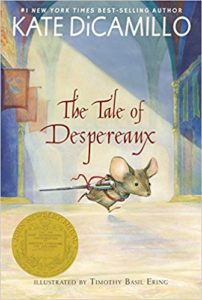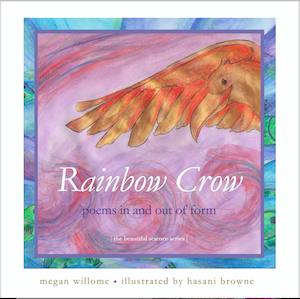When I went to my local movie theater to see A Wrinkle in Time, the teenaged young woman at the register said, “Oh, I loved that book! I can’t wait to see it! Let me know how it is!”
To work at our theater, you have to be 16, so that puts her a couple of years older than Storm Reid, who plays Meg Murray in the film. The film’s director, Ava Duvernay, is in her 40s, like me. The book by Madeliene L’Engle came out more than a half-century ago, in 1962. It still has pull across generations.
Why is Meg so memorable? For one thing, she was one of the first smart girls to be a hero (pre-Hermione Granger). Like Hermione, no racial background is given for Meg in the book, so it’s been easy for many smart girls to see themselves in her, making Duvernay’s choice to cast an actress of color in the role a natural decision.
But I think what sets Meg apart is not just her brain. It’s her faults.
“Meg, I give you your faults.” [Mrs. Whatsit]
“My faults!” Meg cried.
“Your faults.”
“But I’m always trying to get rid of my faults!”
“Yes,” Mrs. Whatsit said. “However, I think you’ll find they’ll come in very handy on Camazotz.”
Here is where the movie veers from the book. In the movie, Meg’s chief fault is not believing in herself. Although insecurity is certainly a common experience during the teen years, I wouldn’t label it a fault. More of a hindrance. I’m also old enough to know that believing in yourself does not always save loved ones or the world.
In the book, Meg’s greatest fault is stubbornness. She’s shown to be stubborn from the very first chapter, unwilling to go-along-to-get-along at school. As she, her brilliant brother Charles Wallace, and her friend Calvin O’Keefe tesser across the universe in search of her father, Meg’s stubbornness is allowed to fully blossom. Someone less stubborn would have given up, would’ve settled for saving herself. I want to gift Meg a Nevertheless, she persisted T-shirt.
The other concept that’s slightly different from the book to the movie is love. In both, love is the greatest power in the universe. But in the book it’s not love for yourself — it’s knowing you are loved. When the IT-controlled Charles Wallace lies to Meg, saying, “Mrs. Whatsit hates you,” Meg counters with this:
“Mrs. Whatsit loves me; that’s what she told me, that she loves me,” suddenly she knew.
She knew!
Love.
That was what she had that IT did not have.
…
She could love Charles Wallace.
Tell me this story isn’t as contemporary as ever.
Have you ever loved someone who changed? A beloved Charles Wallace who suddenly was as un-Charles Wallace-like as a person could be? Where did that boy go? Who did that girl become? How do you continue to love someone who blocks you on every social media platform and in real life?
If you’ve faced such questions, then you’ve lived in Meg’s shoes.
When I read the book, at about age 10, I hadn’t experienced anything quite like this. But it was one of those books I read at the exact right time for it to tesser into my soul. It has done the same for a lot of girls. Probably even for the young woman who sold me my ticket.
When the movie ended, I looked for her, tried to catch her eye (unsuccessfully), to tell her all about it. I wondered how old she was when she read the book. I wanted to ask her if it was one of those books in her life too.
_______________
The next Children’s Book Club will meet Friday, May 11. We’ll read Newbery-winner The Tale of Despereaux by Kate DiCamillo.
Photo by Andrew E. Larsen, Creative Commons via Flickr. Post by Megan Willome, author of The Joy of Poetry.
Browse more Children’s Book Club
“Megan Willome has captured the essence of crow in this delightful children’s collection. Not only do the poems introduce the reader to the unusual habits and nature of this bird, but also different forms of poetry as well.”
—Michelle Ortega, poet and children’s speech pathologist
- Perspective: The Two, The Only: Calvin and Hobbes - December 16, 2022
- Children’s Book Club: A Very Haunted Christmas - December 9, 2022
- By Heart: ‘The night is darkening round me’ by Emily Brontë - December 2, 2022




L.L. Barkat says
I can say…yes… it was one of those books for me. Not just because I was a “smart girl” with glasses, either.
IT was all that a child cannot fathom, while, yet, she knows its terrible power. IT was the eclipsing of voice and volition, until you were nothing and no one in ITs presence.
Who knows. Maybe it was L’Engle who helped me decide quite early, before I really knew how I would go about it, that I would spend the best parts of myself and my substance in making ways in the world for others to find and express their truest, most loving voice and volition.
Such a great book. Thanks for sharing its treasures with us afresh, Megan. 🙂
Megan Willome says
I love the idea that L’Engle might have set you on a path–or at least have helped you to recognize it.
L.L. Barkat says
Literature, good literature: it gives voice to the inchoate, the latent, the amorphous, yes?
It echoes, at times, sounds we don’t even yet know we have heard within ourselves or the world.
And then it sets out a path we can follow, not like a formula, but like an invitation or maybe a question. For me, Meg was an invitation and a question. How tenacious she was. I think I’ve always loved those (in life, or in literature) who are tenacious. Some *do* call that stubbornness. I call it hope.
I’m curious: did Meg speak to you all the more, because she bore your name? Did she (more specifically than the book itself) tesser something into your soul? I wonder how you (how all of us) would be different if we hadn’t met the Megs of stories like this.
Megan Willome says
Stubbornness, hope, tomato, tomahto.
Actually, no, because I can’t stand the name Meg. But I do like this Meg. She was my first modern heroine, my first from science fiction.
I’ve written about a character named Megan from a different children’s book who influenced me: http://www.wacoan.com/a-valuable-book/
Sandra Heska King says
I didn’t read Wrinkle until after I was married, probably in my mid-20’s, maybe pushing 30. I don’t think I “got it” then. I wonder if I would have when I was younger. It was fun to re-read again.
“Stubbornness, hope, tomato, tomahto.” 🙂
Megan Willome says
I think this is one of those books best read when you’re the age of the protagonists. I’m not sure what I would’ve thought of it in my mid-20s.
Enjoyed our workshop discussions of the movie!
Bethany R. says
Enjoyed this post and the substantive and fun comments here. I read this book in 5th grade (after I switched schools) and remember loving it–but could only really recall the cover illustration and Meg.
I reread it a year or two ago for the first time since. Was struck by just how scary it gets. That IT. Like L.L. said above, for something to be “the eclipsing of voice and volition, until you were nothing and no one in ITs presence.” [Shudder] Sounds like middle school. 😉
I also realized how much I loved and was rooting for the character of the often-bullied but wise Charles Wallace. Reminds me at times of The Little Prince.
Last summer my kids and husband all read The Tale of Despereaux! How did I not take a turn? They all loved it, by the way.
Megan Willome says
Callie Feyen calls middle school “the Voldemort years” because they must not be named.
I love the comparison of Charles Wallace to The Little Prince. On rereading the book, his vulnerability struck me.
Looking forward to your thoughts and insight on “The Tale of Despereaux”!
Bethany R. says
Yes, his vulnerability. Thanks for this, Megan. I requested the book (again) from the library. 😉
P.S. I’ll second that, Callie!
Prasanta says
Megan, I appreciate your thoughtful analysis. Meg’s stubbornness and persistence (employed for good) and the idea of being loved are incredibly powerful and inspiring ideas exemplified in this timeless story. Thank you for this post.
Like several of you, I was also in 5th grade and 10 when I first read this book, and it was also life-changing for me; a book that sparked my imagination and thinking as nothing else had done before. This is one of those books that will always be on my *favorites* list.
And ha- “Voldemort years”- love it! 🙂 Too true.